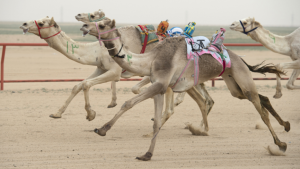
Improving the camel uses: Applied research in health, production, sustainability, and performance
The camel is an important animal component of the fragile desert eco-system and playing important roles in the Arabian Gulf. These animals are used for transport, entertainment, and their fundamental to the social structure of the pastoral society are additional uses. Camel racing and beauty contests take a central stage at a celebration of Bedouin culture held in the area of Arabian Gulf. Nowadays due to global warming with the decrease in waterfalls and natural vegetation camels are considered a reliable substitution, especially in meat and milk, in arid and semi-arid areas. Therefore, many applied research is running under Fujairah Research Centre (FRC) on camel health and to increase its performance either in production and/or traditional purposes. Improvement of camel milk and meat production for sustainability and food biosecurity is our main first purpose. Camel performance in racing depends on the interplay between physiological, genetic, and metabolic processes. Currently, there is no parameter for estimating the readiness of camels for competition and the selection is only based on some the former performance of the father and mother of the selected camels. Improvement of camel genetics is applied through using the new reproductive technologies such as embryo transfer, in-vitro fertilization, cloning, of some superior genetic selected camels. Also, establishment of a metabolic performance profile for those elite racing camels can be used as predictors of camel performance in endurance competition. Additionally, gut microbiota of camels is an important factor for their health, and plays a critical role in metabolism, immunity, and host development. During camel racing and training, camels are fed on some special diets with a limited access to food, and water with a restriction to their movement during the day which leads to stress the camels. Knowledge of the microbial composition and function of ruminal and faecal microbiota can give a clear indication on the racing camels health and performance. Finally, applied research is running to preserve camel sperm and establish sperm banks to be used after the death of these elite and champion camel bulls, avoid the stress and danger of transporting females to male for natural mating and extend the reproductive life span of these elite champions.
